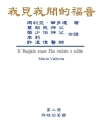In 'Inspiration and Interpretation, ’ John William Burgon delves into the intricate relationship between divine inspiration and literary interpretation of biblical texts. Written with a rigorous yet poetic style, the book reflects Burgon’s profound reverence for scripture, as he meticulously argues for the integrity and authority of the Bible. He addresses contemporary challenges to scriptural understanding, positioning his intellectual discourse within the larger context of 19th-century theological debates, where faith and modernity often collided. His eloquent prose is enhanced by rigorous scholarship, providing a compelling case for the veracity of biblical accounts against a backdrop of emerging critical approaches. John William Burgon, renowned as both a theologian and a prominent Anglican priest, was deeply immersed in the study of biblical texts and the nuances of biblical languages. His own experiences as a scholar and an educator, coupled with his unwavering faith, informed his perspective that divine authority shapes human understanding. This context not only fueled his passion for defending scripture but also allowed him to engage with contemporary thought leaders, ultimately influencing his approach in this foundational text. For readers seeking a deeper understanding of the interplay between faith, scripture, and interpretation, Burgon’s 'Inspiration and Interpretation’ is an essential read. It is not only a scholarly treatise but also a heartfelt appeal to uphold the sanctity of the biblical narrative in an age increasingly challenged by skepticism. This book is invaluable for students of theology, literature, and anyone interested in the enduring power of the written word.
O autorze
John William Burgon (1813–1888) was a distinguished Anglican clergyman and a prolific scholar noted primarily for his unwavering defense of traditional biblical texts and his critiques of textual criticism methodologies that emerged during the 19th century. Graduating from Worcester College, Oxford, he gained recognition as the winner of the prestigious Newdigate Prize for poetry in 1836. Perhaps his most influential work, 'Inspiration and Interpretation’ (1861), stands as a testimony to his conservative approach to biblical hermeneutics and his deep commitment to the doctrine of scriptural infallibility. In his tome, Burgon vigorously argues against the criticisms of the Bible prevalent in his time, asserting the divine origin and authority of the scriptures. His literary style in theological writings is noted for its erudition and eloquence, often imbued with the pathos of an ardent believer in the sacred text he sought vehemently to defend. Beyond his contributions to theological discourse, Burgon’s legacy includes his tenure as the Dean of Chichester, where he served from 1876 until his death in 1888. Burgon’s impact remained influential among subsequent generations of scholars who respected his depth of knowledge in biblical studies and his passionate articulation of conservative theological positions.












